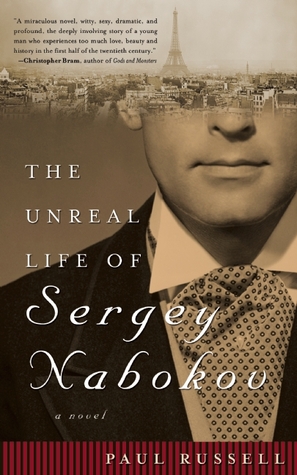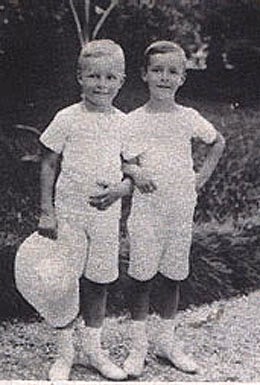The title of Paul Russell’s novel The Unreal Life of Sergey Nabokov is a slight twist on the more famous Nabokov’s (older brother Vladimir Vladimirovich) first novel written in English, The Real Life of Sebastian Knight, in which a non-writer attempts to excavate a biography (with considerable literary criticism of imagined books) of his half-brother who was a prolific writer. Having written his Ph.D. dissertation on the famous Nabokov, Russell knows a lot about the family history.
Until its third published version, the luminous if dubiously reliable memoir Vladimir Nabokov wrote, Speak, Memory, did not mention the younger (by only eleven months) gay stutterer of a brother who crowded him in some ways but never threatened Vladimir’s position as favored son, and then only spent two pages on Sergey. If I had read Speak, Memory more recently, I’m sure that I would recognize variant views on much from that novelistic memoir.

There are many more recognizable figures in The Unreal Life of Sergey Nabokov including Sergei Pavlovich Diaghilev and Sergey Mikhaylovich Lifar and Igor Stravinsky of the Ballet Russe, Jean Cocteau and Pablo Picasso, Pavel Tchelitchew, Gertrude Stein and Alice B. Toklas (all monsters, sacred or not, in some degree, though Diaghilev and Cocteau are treated most gently) and a historical panorama including the Russian revolutions and the consolidation of Nazi power in Germany and Austria. (Both brothers graduated from Cambridge University, an interlude in the book devoid of name-dropping, btw.)
Having survived the Stein summer in San Francisco last year and read a number of memoirs on inter-world-war Paris and the Stein salon, I think that Russell brings the characters there to historically convincing life. Still, the most interesting relationships are mostly imagined by the author: Sergey’s with a butch schoolmate named Oleg (reminiscent of the idolized tough Cocteau’s Le Livre Blanc) and with his nasty, rejecting older brother. In both instances, there is some eventual apology and rapprochement.
Alas, Sergey Nabokov was shipped off to a Nazi concentration camp in mid-December 1943 and died there in January 1945. Russell has Sergey writing his memoirs as he waits for the Gestapo to arrest him after making a subversive remark in the Propaganda Ministry of the Third Reich, where he has been employed (translating from English and Russian). The narrative speeds up after Sergey finds happiness with an Austrian, Hermann Thieme (with a quotation of Tolstoy’s remark about all happy families being the same, at least in that domestic bliss is not very interesting to read about, though this family of two men and the oblivious parents of one does not seem to me likely to have been within the bounds of “all happy families” that Tolstoy thought were “the same”!).
Russell does not compete with Vladimir Nabokov in concocting a pastiche Nabokov style. (He does Gertrude Stein’s perfectly, though!) Sergey views Volodya (the familiar form) as the literary genius and writing to be ground on which he cannot compete. Russell’s prose is, nonetheless, limpid, with arresting observations of people, places, relationships, and the denigration with which Volodya and others viewed Sergey’s “kind”).
Though neither Thomas Mann nor his gay son Klaus pop up in the book, I kept feeling that Klaus, a writer very much overshadowed by his Nobel Prize-winning father (one whose writings Vladimir Nabokov disdained) seemed to me something of a model for Sergay, though Klaus Mann had writing talent and was handsomer than Sergay comes across as being.

For me, The Unreal Life of Sergey Nabokov is the best gay historical fiction I’ve read since Matthew Stadler’s Landscape/Memory, and the best historical fiction I’ve read since David Malouf’s imagination of Ovid’s exile on the Black Sea in An Imaginary Life. It is not going to supplant Speak, Memory, but I’m sure was not intended to.
©7 January 2012

